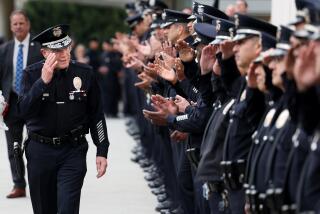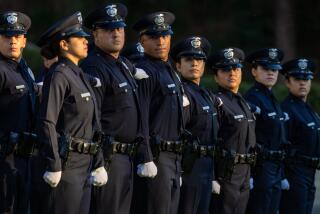Police Chaplain Works Both Sides of Street
- Share via
GLENDALE — Many fighting forces, whether trained to land on enemy beaches or nab crooks on city streets, have a chaplain or two. The Hollywood stereotype pictures them as gentle souls, quoting Scripture to the troubled and confused within their ranks as they face death and violence.
But at least one such cleric, Roy Gaton, one of two volunteer chaplains at the Glendale Police Department, can be armed and dangerous as well.
“I have two chrome-plated Berettas that I practice with,” Gaton said, drawing an imaginary gun from an imaginary holster. The reverend eagerly hopes for the day when he can take target practice at the police range, alongside the officers.
Gaton also stands out because, in addition to counseling officers, he tries to minister to those who find themselves face to face with the law. This proactive approach places him in the forefront of his peers, according to law enforcement and chaplain organizations.
“My first priority is the officers here, the ones who fight crime,” Gaton said. “But I also make a point to talk with those we meet on the street. I feel I have to do it.”
There are roughly 300,000 police chaplains in the country, according to the Fraternal Order of Police. Most have no time to minister outside of police stations, where they are in high demand, said Adolph South, national chaplain to the order.
“But they would help people who need it,” he said. “They never turn anyone away.”
Little information exists on the subject, according to the International Conference of Police Chaplains. “There’ve been no studies or information gathered about police chaplains ministering to those on the street,” said David DeRevere, executive director of the international conference, noting that some 40% of police departments have a chaplain.
Chaplain training is not standardized, and individual chaplains approach work differently, he said.
On a recent patrol, Gaton spoke with the victim of a domestic violence call at her south Glendale duplex. Crying that her husband beat her with a shoe, and that he will spend the weekend in jail for it, the mother of four took Gaton into her three-room home and poured out her woes.
As Gaton moved in to talk with the woman, Officer Paul Lemay stepped back to “let the reverend do his thing.”
There are bills to pay, the woman told Gaton, in teary fits. Her husband’s salary pays the bills, she said. While she continued relating her woes, in Spanish, Gaton recognized the pattern--the life of a domestic abuse victim alternately racked by rage and guilt.
“I told her what I tell many like her,” he said later. “Men cannot be allowed to beat women, no matter how much they depend on the men for support. I told her she doesn’t have to take the abuse, that she needs to be strong and look to her family, her children.”
He also gave her his card, offering a permanent line of communication. “Sometimes, all that’s needed is some common sense and an ear,” he said.
Gaton preaches a tolerant mix of self-reliance and responsibility, often avoiding mention of God to avoid offending those of other beliefs. Gaton never asked the woman her religion.
“I must be able to assist a person in connecting with his own spiritual resources,” he said.
“Whether that’s God or with family, or community, people need to be connected to realize their potential. If they see themselves as alone, they often don’t see a reason to help themselves.”
More to Read
Sign up for Essential California
The most important California stories and recommendations in your inbox every morning.
You may occasionally receive promotional content from the Los Angeles Times.













